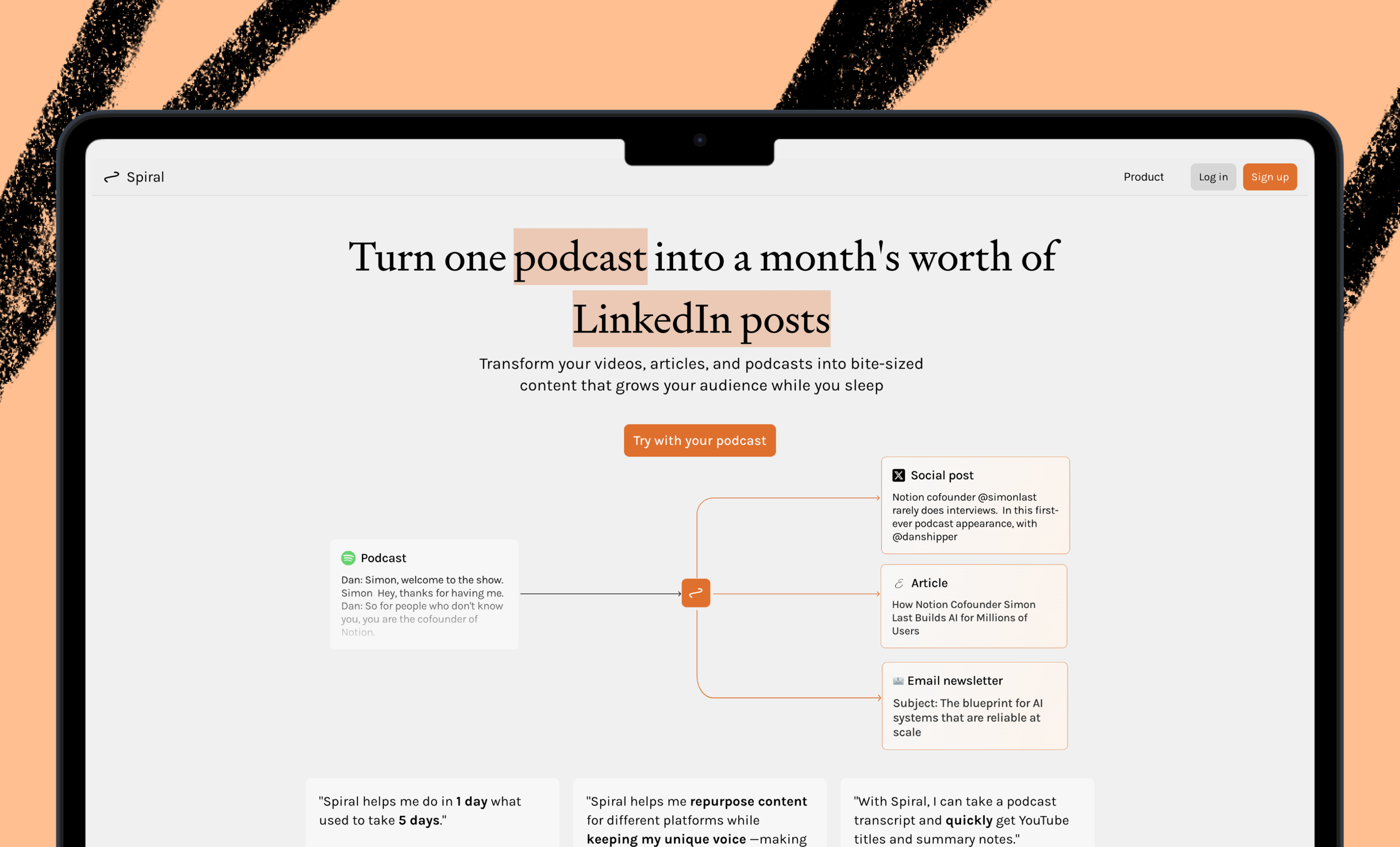.22.19_AM.png)
TL;DR: Today we’re releasing a new episode of our podcast AI & I. Dan Shipper goes in depth with Kevin Kelly, founding executive editor of Wired. Watch on X or YouTube, or listen on Spotify or Apple Podcasts. Here’s a link to the episode transcript.
Was this newsletter forwarded to you? Sign up to get it in your inbox.
Kevin Kelly is a time traveler. He’s spent his career journeying to the frontier of technology—and then returning to tell the rest of us about it.
He used to do this through Wired, the magazine he cofounded 32 years ago. Now, as the publication’s “senior maverick,” Kelly doesn't write as frequently—but he hasn’t stopped traveling through time. He calls his project for 2025 the “Desirable 100-year Future,” an attempt to imagine what the next century could look like, shaped by technologies like AI and genetic engineering, in a world he’d actually want to live in.
On this episode of AI & I, Dan Shipper talks to Kelly about what he’s learned from examining the growth of technology for three decades. They get into why the most valuable relationship with technology isn’t about living at the cutting edge—it’s about knowing when to return; how studying the discovery of electricity can help us make sense of AI; Kelly’s belief that human intelligence isn’t a singular force but a multifaceted compound we don’t fully understand; and how he used ChatGPT to write a novel that he’ll never publish.
You can check out their full conversation here:
If you want a quick summary, here are some of the themes they touch on:
Move through time like Kelly does—wander into the future but stay grounded in the present
Kelly spent part of his adult life in remote parts of Asia, where modern infrastructure was scarce. He likens that experience to the thrill of attending the first-ever Burning Man, where the “unconstrained ability to do what you want without having to ask permission” made it “crazy, chaotic, and wonderful.” But the appeal, he says, was in the impermanence: “It was a great place to visit, but it was only great because I was gonna leave. I have the same kind of thing with… being at the frontier of the internet and/or AI—I can keep going up to the edge to see what's happening, but I don't need to stay there.”
Of course, it’s easier to dip in and out of physical places like Asia or Burning Man, as you can literally leave them behind. But technology—in our smartphones or on our laptops—has a way of following you home. Kelly’s solution is to structure his time so he can stay grounded while still poking at the edges of what’s new. For example, he will “balance reading something about AI with trying to read something historical,” or offset “wrestling with the latest AI stuff with working in [his] workshop and using [his] hands.” This reminded me that history is full of echoes—and examining AI breakthroughs in the context of past technological revolutions can make them less chaotic and more comprehensible.
Our work with AI reveals the nature of intelligence, just like sparks once showed us what electricity was
Kelly draws a parallel between the current wave of AI and the early days of electricity; specifically, in how little we truly understand what we’re working with. In the 18th and 19th centuries, even as scientists staged demonstrations of the sparks produced by electricity, they struggled to explain the forces that created it. Theories ranged from phlogiston—a fictional element said to create fire—to the idea that electricity was a biological phenomenon, based on observations of muscle reflexes. Long-standing assumptions were routinely overturned, like when someone proved electricity could travel through a vacuum, dismantling the belief in aether, a mysterious substance once thought to fill all of space.
In Kelly’s view, intelligence is in a similar fog. We can use it, experiment with it, even build machines that seem to exhibit it—but we still don’t know what it’s made of. He suspects intelligence isn’t a singular force but a compound, a mix of cognitive capabilities we haven’t yet mapped. As he puts it, “You can think of the current AI as if we're making some kind of salt and we don't even know what it's made from.”
Kelly’s belief that human intelligence is an edge case in a world of possible minds
In his belief that intelligence is not a single unified force but a compound made up of different elements, Kelly draws from early AI pioneer Marvin Minsky, who proposed that the mind is composed of many smaller “agents” working together. He sees a modern echo of this in the Mixture of Experts architecture used in some LLMs. These are systems where there are multiple specialized models—each focused on a particular type of task or reasoning—and when the system receives an input, it dynamically selects which of these experts to use, assembling different cognitive strategies on the fly.
Taking this modular approach further, Kelly also argues that human intelligence is not a universal standard, but a highly specific and peculiar compound—one that evolved to suit our particular needs as a species. “We’re an edge species,” he says, occupying just one point in the vast “possibility space of all possible minds.” As we build AI, we won’t just replicate ourselves—we’ll populate that space with many kinds of intelligence, some of which may be so unfamiliar that we won’t even recognize them as intelligent at first.
You don’t always need an audience to make art
Kelly is on OpenAI’s $200-per-month Pro plan, and he uses LLMs for more than organizing thoughts or synthesizing research—he uses them to explore his curiosities purely for personal delight. One day, he realized that Leonardo da Vinci, Martin Luther, and Christopher Columbus were alive at the same time, so he asked the LLM to write a conversation between them, imagining they were snowed in at a hotel together. Then he pushed the scenario further: What if they decided to collaborate? The AI suggested they would found a city based on science and religious freedom. From there, Kelly kept expanding the story, adding characters, backstories, and bringing in figures like Queen Victoria to imagine their global impact. Eventually, the project evolved into an epic saga, and Keller even got ChatGPT to create book covers and write marketing copy for it.
But before you switch tabs to Amazon to buy a copy, you should know that the book isn’t for sale. “The point of all this is that I'm not gonna show it to anybody because I don't need to,” Kelly explains. “The joy of creating it was better than reading it. It was for the audience of one.”
For Kelly, this kind of use case captures something new about generative AI. Most of the 50 million images generated by a variety of AI tools every day, he believes, aren’t for mass consumption—they’re made for the quiet joy of creation itself.
Here’s a link to the episode transcript.
You can check out the episode on X, Spotify, Apple Podcasts, or YouTube. Links are below:
- Watch on X
- Watch on YouTube
- Listen on Spotify (make sure to follow to help us rank!)
- Listen on Apple Podcasts
What do you use AI for? Have you found any interesting or surprising use cases? We want to hear from you—and we might even interview you.
Miss an episode? Catch up on Dan’s recent conversations with the team behind the delightful AI companion Tolan Quinten Farmer and Eliot Peper, star podcaster Dwarkesh Patel, LinkedIn cofounder Reid Hoffman, a16z Podcast host Steph Smith, economist Tyler Cowen, writer and entrepreneur David Perell, founder and newsletter operator Ben Tossell, and others, and learn how they use AI to think, create, and relate.
If you’re enjoying the podcast, here are a few things I recommend:
- Subscribe to Every
- Follow Dan on X
- Subscribe to Every’s YouTube channel
Rhea Purohit is a contributing writer for Every focused on research-driven storytelling in tech. You can follow her on X at @RheaPurohit1 and on LinkedIn, and Every on X at @every and on LinkedIn.
We build AI tools for readers like you. Automate repeat writing with Spiral. Organize files automatically with Sparkle. Write something great with Lex. Deliver yourself from email with Cora.
We also do AI training, adoption, and innovation for companies. Work with us to bring AI into your organization.
Get paid for sharing Every with your friends. Join our referral program.










Comments
Don't have an account? Sign up!